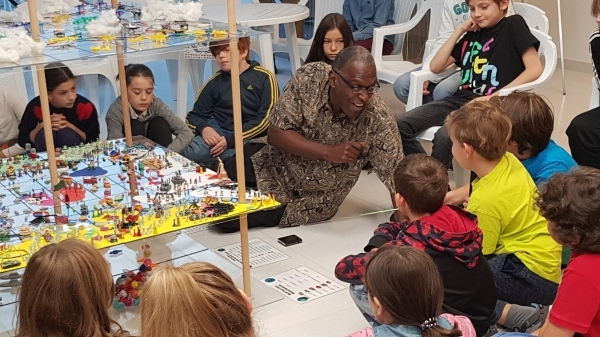BRATTLEBORO — Due to the COVID-19 pandemic, education at all levels is in flux. In response, Epsilon Spires is sponsoring a film series focused on radical pedagogy.
A communications center that seeks social impact through art and science, Epsilon Spires is hosting the series on alternative education models “to encourage discourse towards positive change.”
“In our current times,” said Jamie Mohr, creative director, “when the instability and inequity of the systems and structures in place have become so apparent, and with children returning to schools, there is increased public interest in micro-schools and homeschooling.”
The series will feature one film and discussion on the topic per month.
First up, through September, is World Peace and Other 4th Grade Achievements, Chris Farina's award-winning documentary about teacher John Hunter.
On Wednesday, Sept. 30, at 1 p.m., Epsilon Spires will host a Zoom discussion with Hunter and Farina. A link will direct people to both the streaming page and the RSVP for the discussion.
Hunter, the teacher who developed the World Peace Game, is a native of Richmond, Va., and a graduate of Virginia Commonwealth University. Taking time out from studying comparative religions and philosophy during his college years to travel in China, India, and Japan, he became interested in the principles of nonviolence and the conundrum of how to teach peace in an often-violent world.
At Richmond Community High School in 1978, Hunter first introduced the World Peace Game to students, using a 4-by-5-foot plywood map on the floor.
Subsequently, he moved to Charlottesville, where he now teaches fourth graders.
In a 2011 TED Talk, Hunter described how the game, which takes place over eight weeks, has evolved to a 4-foot Plexiglas cube with four layers: an outer space layer, an air and space layer, a ground and sea level, and an undersea level. There are four countries - some are poor, some are rich. The kids make up the names. Each country has a cabinet to make decisions.
A 13-page crisis document, he continued, lays out 50 interlocking problems, so that if one thing changes, everything changes. These crises include ethnic and minority tensions, chemical and nuclear spills, nuclear proliferation, oil spills, environmental disasters, water rights disputes, break-away republics, famine, endangered species, and global warming.
For the game to be won, all 50 interlocking problems have to be solved. Every country's asset value has to be increased above its starting point. Students, he said, find out what is right “their own way, their own selves.”
The students read from Sun Tzu's The Art of War to learn how not to follow the paths of power and destruction to war, but to practice long-term, consequential thinking to find other ways to engage.
Hunter said that even though he is throwing his students into this complex matrix, they trust him because of the deeply rich and supportive relationship he has developed with them. They believe in their own abilities to think critically and solve problems creatively, rising to the occasion to apply themselves.
Through the World Peace Game Foundation, Hunter, who has received many awards in his four decades of teaching, generally offers formally trained educators master classes, now suspended during the pandemic. Information is available at worldpeacegame.org.
Farina's films, as described on the Rosalia Films website, “specialize in telling the stories of individuals whose profound contributions to their community have often gone unnoticed” with the goal of “expanding the audience's notion of what it means to be human” and guided by “the principle of respect for the individuals portrayed.”
Farina was born and raised in Baltimore, Md. He moved to Charlottesville, where he still lives, to attend the University of Virginia for his undergraduate education. After earning an M.A. in communications at American University, Farina made World Peace and Other 4th Grade Achievements, his third film, which had its world premiere in 2010.
The film has earned numerous awards, including Best Film/Audience Award at the Bergen International Film Festival in Bergen, Norway, and the Youth Vision Award at the United Nations Association Film Festival. In 2012, the film began a two-year run on public television, reaching over 85 percent of the United States' population, and it was broadcast in several other countries.
“We hope the series will help create a springboard for partnerships between different schools, homeschooling groups, and others interested in developing new approaches toward teaching,” Mohr said. “We also welcome suggestions for films and discussion topics from local educators, families, and others who are passionate about the subject.”
